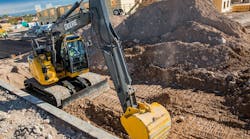We cannot solve the technician shortage. A bold statement, but not one made without considerable thought and conversation. Equipment managers cannot look to the equipment industry; we cannot expect a broad reversal in systemic changes in the culture and the market.
Machine sophistication in both componentry and technology requires a highly educated technician, trained in diagnostics and electronics as much as in mechanical technique. Public schools, responding to community demands, have all but ostracized students who show a mechanical interest. Many of them drop out of high school, effectively eliminating their opportunity to learn the mathematics and science that today’s technician needs.
Competition for mechanically inclined men and women is heightened. Equipment distributors, auto dealers, and truck dealers are targeting the same young people that equipment fleets recruit.
Fleets have options, but they require a shift in effort from the national front to the local. Each fleet must recruit, train and competively compensate its own technicians. Managers must develop deep relationships in their own communities. They must find out where the public schools send the mechanically inclined students for their training. They can offer internships, apprenticeships and expertise to the technical school or community college in their area. Work with younger students, too, creating opportunities for them to interact with machinery and trucks during festivals or other family-oriented community events. And yes, fleets must evaluate their pay scales against the local market.
In a recent blog, I suggested that fleets turn to equipment distributors for telematics support. Fleets could also turn to dealers for technician labor by outsourcing more complex maintenance and repair work.
Mike Vorster, who writes our Equipment Executive column, suggested another solution. Instead of increasing the supply of technician labor, Vorster said, decrease the demand for the labor. Take the technician problem to senior management, showing how improving machine care in-house would reduce the need for certain repairs. Operations, for example, could reduce operator abuse and neglect. As machine quality and durability continue to improve, fleets can replace labor-intensive machines with newer models.
Back to our opening bold statement. The industry cannot “solve” the shortage, but individual managers of equipment can. They must think differently—locally and strategically—because their fleet maintenance depends on it.





